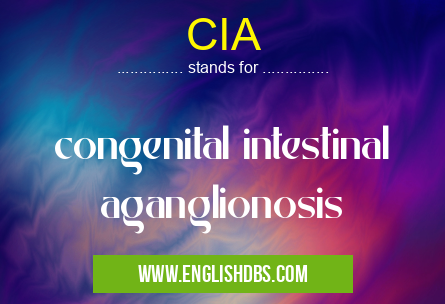What does CIA mean in BRITISH MEDICINE
Congenital intestinal aganglionosis (CIA) is a rare, congenital disorder that affects the nerves in the intestines. This condition results in varying degrees of intestinal obstruction, depending on how much nerve tissue is missing or damaged. It is estimated that only about one in every 20,000 children are born with this condition. Therefore, it is important for healthcare providers to be aware of CIA and its associated symptoms so that early diagnosis and intervention can be provided.

CIA meaning in British Medicine in Medical
CIA mostly used in an acronym British Medicine in Category Medical that means congenital intestinal aganglionosis
Shorthand: CIA,
Full Form: congenital intestinal aganglionosis
For more information of "congenital intestinal aganglionosis", see the section below.
What Is CIA?
Congenital intestinal aganglionosis (CIA) is a rare medical condition in which the autonomic nervous system fails to develop properly during fetal growth, resulting in a lack of ganglion cells along the digestive tract. Without these nerve cells, normal peristalsis (the muscular motion of digesting food) cannot occur properly and this leads to partial or complete obstruction of the intestine. As a result, infants with this condition face severe malabsorption and dehydration issues if not diagnosed and treated quickly and appropriately. Symptoms include vomiting, abdominal pain/discomfort, intestinal distention or bloating, diarrhea or constipation, failure to thrive, lethargy and poor overall health due to malnutrition.
Diagnosis
The diagnosis of CIA can be difficult as there may not be obvious signs or symptoms present until later into infancy or even toddler years. Generally speaking though there are several tests which can be used to diagnose CIA including x-rays, barium enemas/swallow studies and endoscopy exams. Additionally certain laboratory values such as serum levels of electrolytes such as sodium can also provide clues as well as stool tests which measure fat levels due to malabsorption issues caused by CIA. If any of these tests show abnormalities then measures will usually be taken such as an exploratory laparotomy surgery which allows doctors to directly examine the intestine for any blockages present.
Treatment
The primary treatment for CIA involves surgically removing some or all parts of the bowel affected by the aganglionic segment(s).Depending on what part(s) of bowel are affected by this disorder then there are two main techniques which may be used; enteroplication/intestinal lengthening procedure (ILP)or resection-anastomoses procedures (RAP). The former focuses on simply removing any blockages caused by organs being improperly connected whilst RAP involves physically cutting out tissue before reattaching after stretching healthy sections using sutures creating “bridges” between them allowing for smooth movement past these segments again thus unblocking them entirely.
Final Words:
In conclusion Congenital Intestinal Aganglionosis (CIA) is a rare yet very serious medical disorder affecting mainly infants but also potentially older children if left undiagnosed and untreated. However with close monitoring both from parents and healthcare professionals it should hopefully become simpler for doctors to identify potential cases earlier on making treatments far more effective at reducing long-term damage done by blocking portions stomach lining necessitating surgical removal.
CIA also stands for: |
|
| All stands for CIA |
